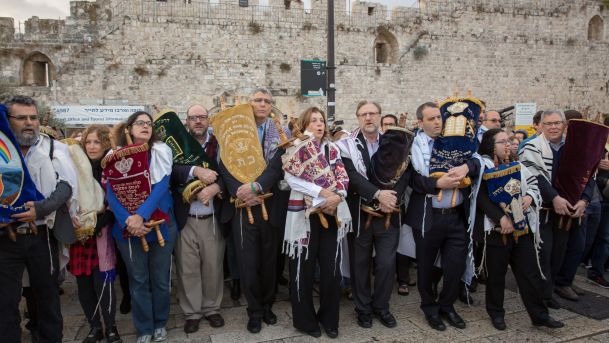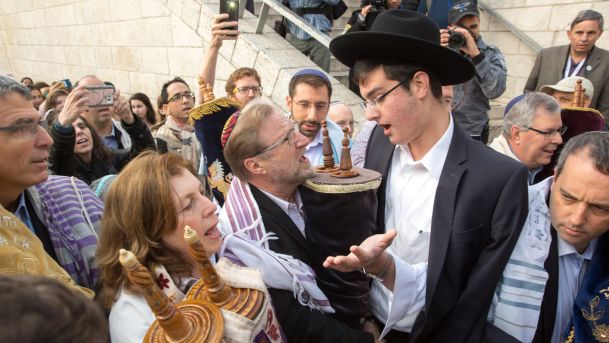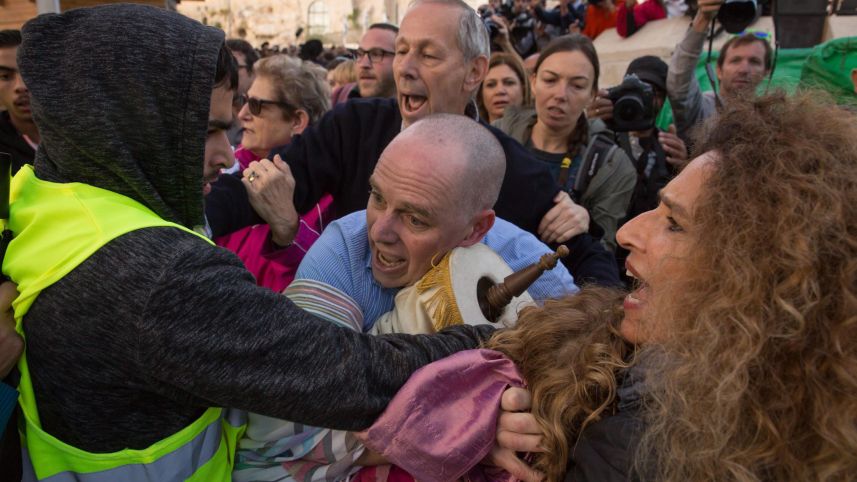The Western Wall was a scene of pandemonium and unprecedented violence on Wednesday morning, after Reform and Conservative Jewish leaders broke through security barriers with Torah scrolls in their arms, in defiance of the ultra-Orthodox authorities who run the holy site, in protest against Israel’s inaction on providing a promised egalitarian prayer space.
Some of the most prominent names and faces in the Jewish religious world were shoved, pushed and even thrown to the ground when they resisted security officials stationed at the Western Wall, one of Judaism’s holiest sites, and made their way to the designated prayer plazas in a procession.
A group of about a dozen rabbis led the march, which started at Dung Gate in the Old City and ended at the Western Wall. They were accompanied by about 200 supporters, as well as a delegation of activists from Women of the Wall, the multidenominational feminist prayer group. Dozens of others later joined them at the prayer plazas.
Responding to the events, Prime Minister Benjamin Netanyahu’s office called the protest regretful, saying in a statement that “unilateral breaches of the status quo in the Kotel harm our attempts to reach a compromise.”
 The procession was called to protest the failure of the Israeli government to follow through with its commitment to create a new egalitarian space at the Western Wall, where men and women can pray together. Netanyahu had appealed to the organizers on Tuesday to refrain from demonstrating, but to no avail.
The procession was called to protest the failure of the Israeli government to follow through with its commitment to create a new egalitarian space at the Western Wall, where men and women can pray together. Netanyahu had appealed to the organizers on Tuesday to refrain from demonstrating, but to no avail.
Leading Wednesday’s procession were Rabbi Steven Wernick, chief executive officer of The United Synagogue of Conservative Judaism, and Rabbi Rick Jacobs, president of the Union for Reform Judaism. Also bearing Torah scrolls in their arms were the leaders of their sister movements in Israel and Anat Hoffman, chair of Women of the Wall.
The organizers succeeded in obtaining, for the first time ever, a special permit from police to bring their Torah scrolls to the Jewish holy site. The Western Wall Heritage Foundation, which operates the site, prohibits worshippers from bringing Torah scrolls into the site. It keeps several dozen scrolls at the site for use in the men’s prayer area but has never allowed women access to them.
The police did not, however, notify the Western Wall Heritage Foundation that such a permit had been issued at the last moment. For that reason, when the protesters arrived at the security checkpoint by the Western Wall, personnel employed at the site tried to stop them from bringing the Torah scrolls inside. When the protesters resisted, attempts were made to remove the Torah scrolls from their arms, often forcefully.
Once they pushed past the security personnel, the Torah-bearing rabbis were confronted by ultra-Orthodox protestors, mainly very young boys, who also tried to push them back. Numerous scuffles and fistfights broke out. Many of the rabbis carrying the Torah scrolls, including women, were physically bruised.
 Police stationed at the site did not intervene to stop the violence. Instead, they observed and even filmed the scene. “The fact that there was no bloodshed was a miracle,” said Noa Sattath, a Reform rabbi and director of the Israel Religious Action Center, the advocacy arm of the Reform movement in Israel.
Police stationed at the site did not intervene to stop the violence. Instead, they observed and even filmed the scene. “The fact that there was no bloodshed was a miracle,” said Noa Sattath, a Reform rabbi and director of the Israel Religious Action Center, the advocacy arm of the Reform movement in Israel.
Just before the procession arrived at the Western Wall security checkpoint, its members were met by Motti Dan, head of Ateret Cohanim, a right-wing organization that has lobbied against the government plan to create a new egalitarian space at the Western Wall. Dan pleaded with the protestors to “respect the custom of the place” and not enter with their Torah scrolls. His pleas fell on deaf ears.
The procession coincided with the monthly prayer service held by Women of the Wall to mark the beginning of the new Jewish month. Many Jewish leaders from abroad were in Jerusalem to participate in the Jewish Agency Board of Governor meeting and took advantage of the opportunity to join the procession.
After being pushed and shoved by security personnel at the Western Wall, Rabbi Andy Sacks, director of the Rabbinical Assembly of the Conservative movement in Israel, appeared visibly shaken up. “Those who seek to take Torah scrolls from our arms will not be forgiven until they do serious tshuva [repentance],” he said.
Many of those who witnessed the scene at the Western Wall this morning described it as a game-changer. “This should be a wake-up call to the prime minister that it’s high time he followed through with the government decision,” Sattath said.
“After this, there is no going back to what was,” said another rabbi who asked not to be identified.
When asked why organizers of the event had defied Netanyahu’s call to abstain from demonstrations, Sattath replied: “We have refrained for 10 months, and we’ve seen that it yields no results. We are sick and tired of waiting for promises that are not realized.”
Over the past three years, confrontations have occasionally broken out at the Western Wall when Women of the Wall activists held their monthly service there. But veterans of those clashes concurred that none were as violent as those that broke out on Wednesday morning.
Last January, the government voted to create a new section at the southern part of the Western Wall – near the area known as Robinson’s Arch – where members of the non-Orthodox movements could hold egalitarian prayer services. The deal was struck following three years of negotiations. However, under pressure from his ultra-Orthodox coalition partners, Netanyahu has refrained from implementing it.
The ultra-Orthodox oppose granting formal recognition to the Reform and Conservative movements, which they regard as illegitimate, at the Jewish holy site.
Last week, the Israeli government was issued a three-week deadline by the High Court of Justice to explain why it has not followed through with its decision to create the new space at the Western Wall. That was in response to a petition filed by the non-Orthodox movements demanding that the government either fulfill its commitment, or alternatively, re-divide the existing gender-segregated areas at the northern expanse of the Western Wall to make room for egalitarian prayer services.
“We have seen the Israeli government so adamant in recent about condemning UNESCO for denying the connection of the Jewish people to the Western Wall,” noted Yizhar Hess, director of the Conservative Movement in Israel. “But right now the Israeli government is denying the connection of half the Jewish people to the Western Wall.”
While Women of the Wall held their morning service, ultra-Orthodox demonstrators consistently heckled them, sometimes using loud whistles to drown out the sounds of their prayers. After police refused to intervene, male supporters of the group – among them prominent rabbis – entered the women’s section to prevent an outbreak of violence. By the end of the service, the women’s section of the Western Wall was swarming with men – an almost unprecedented sight.
Following the women’s service, participants in the procession held a second egalitarian prayer service in the upper plaza, which overlooks the designated prayer areas.
Rabbi Jacobs of the Reform movement said he and other Jewish leaders were not deterred by the outbreak of violence on Wednesday. “We will not forfeit our right to be here,” he said. “We will change this place, we will change this country and make this a home for all Jewish people.”
reprinted with thanks to Ha’Aretz and Journalist Judy Maltz

